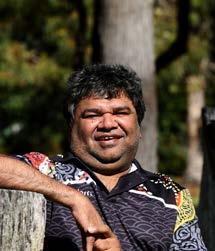
3 minute read
QAIHC Youth Health Network Kyle Bekue
from Sector Leader Issue 22 August/September 2021
by Queensland Aboriginal and Islander Health Council (QAIHC)
INTRODUCING Kyle Bekue
QAIHC Youth Health Network member
Advertisement
The QAIHC Youth Health Network provides an opportunity for young people to come together and yarn about health and develop solutions for their health and wellbeing.
How old are you?
I am 22 years old.
Who’s your mob?
I am an extremely proud Yuggera Ugarapul man, a proud traditional owner over south Brisbane, Ipswich and Toowoomba regions.
What are you studying?
I am currently studying a Doctor of Medicine at UQ and recently completed by Bachelor of Biomedical Science (last year).
Tell us a bit about your journey into the health sector.
I remember being a little boy who didn’t have his priorities in place correctly. I was too focused on surviving as an Indigenous boy in a white man’s school system to care for my own grades or own well-being. The turning point for me was after my father and mother decided they couldn’t live together anymore. It left me broken, even more so than I was before. I hit rock bottom at the end of Year 9 emotionally and physically and it was the most awful time in my life; I felt alone. So, I turned to my books, applied myself and distracted myself with assignments and exams to try and fill the emptiness inside. I refused to become a statistic and become part of the data that condemns Aboriginal and Torres Strait Islander peoples to a life of struggle and shame. I took my education into my own hands! I began applying for experiences through school. I was accepted into the SPARQ-ed program at the Translational Research Institute in Annerley. We researched HPV-induced cervical cancer and were focusing on a treatment for individuals who already have this disease. I got to work alongside Dr Ian Frazier’s and Dr Brian Gabrielli’s team; the same people who created the Gardasil vaccination; it was such an eye-opening experience. This opened my heart to the possibility that this is the sort of work I want to do with my life. So, I pushed myself even harder. I eventually realised that I wanted to pursue a career in medicine. This was a hard decision because I knew the hard work required to achieve it. And especially being a blackfulla chasing this pathway, I knew I had to apply myself in ways others may not have to. My mother instilled in me a motto that will define the trajectory of the rest of my life... That as an Indigenous man, there will be times when I need to work harder, smarter, and more diligently than my non-Indigenous counterparts. So, I did just that for the remainder of my high school years. I ended up achieving the Dux honour at my school and achieved an OP1 in 2016. I went on to receive the Highest Achieving Aboriginal and Torres Strait Islander Student in the cohort of 2016 which was recognised by the QCAA. I ended up getting into the Doctor of Medicine program with these accolades and here I am today, living my dream.

Why is it essential that youth are involved in discussions about their own health?
Youth need to be in power of the policies that affect them. I believe that there is too much stigma in today’s society around what young people can contribute to the discussions in any arena. The insight you get from these young people is valuable! I currently run camps with UQ InspireU’s outreach program. I also go on rural Queensland school tours with the Queensland Aboriginal and Torres Strait Islander Foundation. Both programs have provided me valuable insight into the lives that these young people are currently facing. It has humbled me as an ambassador on these tours and camps to listen and to realise that sometimes my point of view isn’t the shared point of view of the people I’m trying to help. It is important for anyone in any place of power to listen to the people you are helping.
Who inspires you?
My people do. Every single one of them. All my Indigenous brothers and sisters, Aunties and Uncles. The adversity my people overcome every single day while living their lives is truly inspiring; and I just want to acknowledge their struggles as well as their resilience.
Why is the Youth Health Network important?
It opens that dialogue to allow conversations to take place. This network, I believe, provides Aboriginal and Torres Strait Islander youths with some self-determination to be in control of the policies that affect them.








